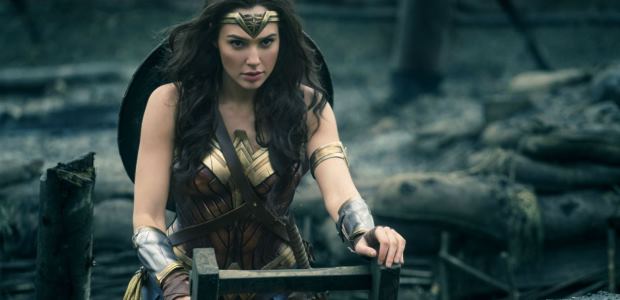Patty Jenkins returns to the director’s chair after 14 years to give us Wonder Woman’s definitive superhero origin movie. Not that there has been another one, but Wonder Woman is so sure-footed and delightful that it establishes its titular heroine to film-lore with a permanency similar to Richard Donner’s Superman. The film’s narrative drives on an emotional core, preferring to allow the audience to not just discover a new superhero and her powers but to connect with Wonder Woman’s need to save people.
Wonder Woman opens in the present-day to establish continuity with the previous DC films, before the story quickly goes back in time to the creation of the secluded paradise island of Themyscira and the origins of the Amazon women. Thereon we stay with Diana, Princess of the Amazons, from her innocent childhood to an adult trained warrior. When Steve Trevor, an American World War 1 pilot crash-lands on the island, Diana decides to venture into the outside world to stop the World War, and in the process she discovers her full powers and true destiny.
With now four DC Universe films (after Man of Steel, Batman V Superman and Suicide Squad), their distinctive feature is that each director makes his/her movie in their own individual style, evident from the clear distinctions in Zack Snyder’s, David Ayer’s and now Patty Jenkins’ films. This individualism allows for Jenkins to carve out her own piece of cinema that fits her vision for the Wonder Woman, and her place in current superhero culture. It also means that Wonder Woman, as a stand-alone movie, is not slave to a pre-existing palate. Her movie therefore walks a middle path to Marvel’s entertaining and low-stakes films vs Snyder’s solemn and grim DC work.
Wonder Woman’s narrative is simple, the characters are clear in their motivations, and the action is thrilling. The movie’s strength though lies in the drama of and between its characters. Jenkins puts Diana through a myriad of emotions, imbibing them with a level of empathy rare to the genre (and only surpassed by this year’s Logan). The humour is also natural to the characters, especially in the fish-out-of-water situations (Steve Trevor on Themyscira, and Diana in London). But as is the fallacy in most superhero origin movies, Wonder Woman suffers from poorly-established villains, especially the main antagonist with a penchant for speeches and a built-in weakness against the hero. Doctor Poison, a supporting antagonist, is portrayed in full camp-mode. The CGI is also suspect in some sequences, but this is more easily forgiven.
The biggest win for the movie is having Gal Gadot play Wonder Woman. Superhero castings in recent years have been mostly spot-on, whether with Deadpool, Doctor Strange or even the new Spider-Man. Gal Gadot not only continues that trend, she embodies Wonder Woman in a way that is likely to take over an entire generation’s imagination – quite possibly the way Christopher Reeves did with Superman. Burdened with portraying the most well-known female superhero, but one few (other than fans) know anything about, Gadot established her authority on the character. The beauty and physicality she brings to the role were quite evident from the little we saw of her in Batman V Superman. Here, we get to see it in full effect, as well as her charm and dramatic range, which is spot on too. Equal to her is Chris Pine as Steve Trevor. His leading man appeal, coupled with his comedic timing makes his character worthy of someone whom Wonder Woman would fall in love with (and would likely reminisce about, even in the future company of Superman and Batman). The little moments they share is the chief recall of the movie.
Defying conventional Hollywood wisdom three times over with one movie, Patty Jenkins has proved that a female director can make a big budget movie with a female superhero, and do a stellar job of it. As with the character within the movie, and her influence in the real world, hopefully Wonder Woman will allow for more breaks from established Hollywood tradition. Lofty aspirations aside, the movie succeeds on a fundamental level. And that is likely to satisfy even the most adamant of DCEU detractors.
Rating: 




